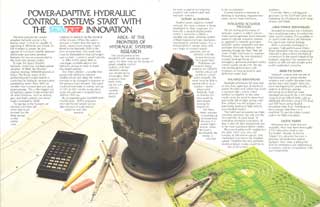Smart Pump
brochure text
ABEX: AT THE FRONTIERS OF HYDRAULIC SYSTEMS RESEARCH
The development of the SMARTPUMP variable flow pump opens the door wide for the design of power adaptive control systems, with their attendant energy and weight savings. Abex engineers have been studying the concept of a variable pressure pump for years as part of our ongoing research into sophisticated new hydraulic systems.
ROTARY ACTUATORS
Another power adaptive control concept, the rotary actuator, is being developed by Abex engineers, It is basically a variable displacement motor: a servovalve controls a variable cam plate, allowing control of fluid displacement per revolution, and therefore controls torque. This is energy-efficient: torque varies with cam angle at constant supply pressure, and so provides only the torque necessary for a given load. Prototypes are urrently being tested in the DIVADS mobile anti-aircraft system to control turret azimuth. The turret must be able to operate off an accumulator - stored pressurized hydraulic fluid - so that the first shot could be fired before turning the engine on.
The Abex rotary actuator is economical of stored fluid because it is power regenerative: when the load is decelerated, the energy is returned to the accumulator.
Current research is directed at defining its operating characteristics under various load conditions.
INTEGRATED ACTUATOR PACKAGES
We are testing performance of hydraulic systems in which electric-motor pumps generate local hydraulic power to operate actuation systems, as opposed to centrally generated hydraulic power. Integrated actuator packages eliminate hydraulic lines running through the ship. They are more reliable and easier to maintain. Presently, Abex has one integrated actuator package flying: an emergency get-home-and-land rudder control system on the F-14. We are now testing performance with emphasis on heat generation and deflection under load.
|
 |
FAIL-FIXED SERVOVALVES
Standard servovalves fail near null, or zero flow, upon loss of electrical power. But electrical failure that sends a spurious high current, either positive or negative, to the valve, could cause the spool to move hard over to the left or right, giving a full flow of fluid into the actuator and potentially leading to high velocity uncontrolled motion.
The Fail-Fixed servovalve has three zero-flow positions: the null and the two extremes of spool travel. At exte , riding overstroke conditions, all flow is shut off, thus neutralizing one of the most significant failure modes.
Because of pulse width modulation the valve "sees" only zero, full forward, or full reverse signals, time modulated to produce the required output. Therefore the only probable electrical failure modes would be to one of the closed positions.
Currently Abex is refining port geometry on the Fail-Fixed valve and extending its utilization to a full range of sizes and fluids.
DIRECT-DRIVE SERVOVALVES
Standard servovalves use a hydraulic force amplifying system to control the valve spool's motion. This amplifier is an open-center device and therefore has significant internal leakage.
Abex is currently working on a compact, high performance Direct-Drive servovalve that uses a high-force solenoid to give a direct mechanical connection to the spool instead of the hydraulic amplifier. Our research will lead to an efficient and reliable pulse width modulated controller.
8000 PSI PUMPS
Hydraulic systems that operate at high pressure can utilize smaller actuators and smaller diameter lines, saving space and weight. Abex has been investigating the practicality of systems at 8000 psi: pumps delivering oil at 8000 psi have operated successfully for 2,200 hours using fluid per MIL-H-5606, with an additional 600 hours using CTFE fluid and 500 hours using Skydrol , phosphate ester fluid. Prototypes of these pumps have flown in a modified T2j aircraft rudder control system for flight evaluation.
EXOTIC FLUIDS
Whenever new fluids become available, Abex tests them thoroughly. CTFE halocarbon fluid is nonflammable. Despite its density (1.8g/cc) it is attractive because it provides full protection against hydraulic fires. Abex is testing this fluid for endurance and performance in systems, and for compatibility with our components.
|
|